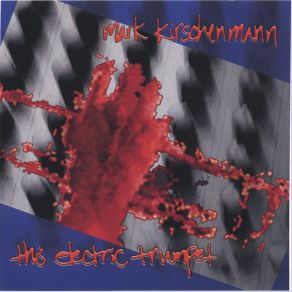This Electric Trumpet
Download links and information about This Electric Trumpet by Mark Kirschenmann. This album was released in 2005 and it belongs to Electronica, Rock genres. It contains 9 tracks with total duration of 50:35 minutes.

|
|
|---|---|
| Artist: | Mark Kirschenmann |
| Release date: | 2005 |
| Genre: | Electronica, Rock |
| Tracks: | 9 |
| Duration: | 50:35 |
| Buy it NOW at: | |
| Buy on iTunes $9.99 | |
Tracks
[Edit]| No. | Title | Length |
|---|---|---|
| 1. | Feed the Meter | 4:25 |
| 2. | Fat Lip | 4:20 |
| 3. | Phantom Archive | 6:12 |
| 4. | PenduluMelisma | 5:29 |
| 5. | Army of None | 10:58 |
| 6. | Spirals, Ribbons and Rinds | 6:16 |
| 7. | Meet the Plumber | 4:45 |
| 8. | Menthol Shadows | 2:09 |
| 9. | Beacon | 6:01 |
Details
[Edit]Mark Kirschenmann's electric trumpet is, to twist a phrase of James Thurber's, something very much like nothing anybody has heard before. The supplied descriptions of a "processed and amplified acoustic trumpet" don't quite cover it. There are lots of layers of music happening on this recording, but Kirschenmann is a solo performer. His trumpet is run through a chain of electronic devices that he can operate individually or simultaneously. It can sound like an electric guitar, a keyboard, a bass, or, once in a while when you least expect it, an acoustic trumpet. It can play chords. Some of the shoals that divert Kirschenmann's river of sound, like a wah-wah pedal, are familiar; some are new. Kirschenmann accompanies himself with turntables, spinning at different speeds so as to create intertwining beats. One way to get a grip on just how many balls Kirschenmann has in the air here is to think of his music as poised astride several different genre boundaries. Is it jazz? Despite all the electronic intervention, he is improvising on a trumpet over fixed, cyclical rhythms. Is it classical music? The variety of ways in which purely electronic sounds are organized here owes much to the realm of contemporary music that affiliates itself with the classical tradition. And the turntable beats carry the music across the boundary between the cultivated traditions of jazz and classical music on the one hand and the electronics of modern popular dance music and hip-hop on the other. With one exception, the lengthy Army of None, it doesn't take much to imagine Kirschenmann collaborating with urban beatmakers instead of doing the beats himself (and wouldn't that make an interesting experiment?) on most of these compositions. One of the most innovative features of This Electronic Trumpet is that Kirschenmann is one of the first contemporary musicians with ties to the classical sphere to use popular rhythms not as part of an ironic collage or blank pastiche, but simply as part of a naturally evolving language. And, on top of this, Fat Lip (track 2), with its trumpet-cum-rock guitar licks, is a piece progressive rockers will feel at home with.
There are subtler boundaries being crossed and recrossed here as well. A musical instrument is, at its most basic level, a tool, an extension of the body, a medium between humans and their environment. At some point, tools entrap humans, tying them to the operation of machines, at which point humans try to extend their reach. There's something fascinating about a trumpet that has unfurled itself into the surrounding environment several more degrees beyond the end of the bell. It speaks of the same effort to put the soul back into the machine that makes hip-hop so fascinating.
All of which makes this recording sound more abstract than it really is. Given the weight of all the electronic equipment he's working with, Kirschenmann is remarkably lighthearted, even humorous at times. The nine pieces on the album, ranging from just over two to 11 minutes in length, are a remarkably varied group in sound, texture, and genre reference. Some are structurally simple and exploit the sheer fun that is implicit in the one-man band concept, while Army of None is a more involved concept juxtaposing chorale-like material from Kirschenmann's trumpet with swirling electronic patterns. Spirals, Ribbons and Rinds is both fun and involved, with the trumpet standing in for a sort of 1960s soul-jazz organ but then entering into complex counterpoint with itself and with a heavier rock figure as the turntables fade in and out. In all, it can safely be said that if you're looking to hear something totally new and have a good time doing it, look no further than This Electric Trumpet., Rovi